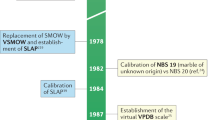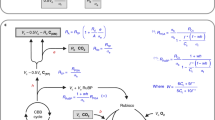Abstract
Carbon isotope fractionation between gaseous carbon dioxide and aqueous bicarbonate decreases from 9.2 to 6.8 parts per thousand over the temperature range 0°–30° C. This fractionation occurs in the hydration stage, not in the passage of atmospheric carbon dioxide through the air–water interface.
This is a preview of subscription content, access via your institution
Access options
Subscribe to this journal
Receive 51 print issues and online access
$199.00 per year
only $3.90 per issue
Buy this article
- Purchase on Springer Link
- Instant access to full article PDF
Prices may be subject to local taxes which are calculated during checkout
Similar content being viewed by others
References
Reid, A. F., and Urey, H. C., J. Chem. Phys., 11, 403 (1943).
Craig, H., Geochim. Cosmochim. Acta, 3, 53 (1953); J. Geol., 62, 115 (1954).
Abelson, P. H., and Hoering, T. C., Proc. US Nat. Acad. Sci., 47, 623 (1961).
Saruhashi, K., Pap. Met. Geophys. Tokyo, 6, 38 (1955).
Park, R., and Epstein, S., Geochim. Cosmochim. Acta, 21, 110 (1960).
Author information
Authors and Affiliations
Rights and permissions
About this article
Cite this article
DEUSER, W., DEGENS, E. Carbon Isotope Fractionation in the System CO2(gas)—CO2(aqueous)—HCO3−(aqueous). Nature 215, 1033–1035 (1967). https://doi.org/10.1038/2151033a0
Received:
Issue Date:
DOI: https://doi.org/10.1038/2151033a0
This article is cited by
-
Preliminary fluid geochemical survey in Tete Province and prospective development of geothermics in Mozambique
Geothermal Energy (2022)
-
Insights into the Porretta Terme (northern Apennines, Italy) hydrothermal system revealed by geochemical data on presently discharging thermal waters and paleofluids
Environmental Geochemistry and Health (2022)
-
A stable isotope toolbox for water and inorganic carbon cycle studies
Nature Reviews Earth & Environment (2021)
-
Isotope fractionation and 13C enrichment in soil profiles during the decomposition of soil organic matter
Oecologia (2007)
-
High turnover of inorganic carbon in kelp habitats as a cause of ?13C variability in marine food webs
Marine Biology (1993)
Comments
By submitting a comment you agree to abide by our Terms and Community Guidelines. If you find something abusive or that does not comply with our terms or guidelines please flag it as inappropriate.



